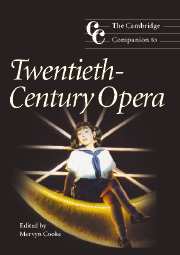3 - Puccini and the dissolution of the Italian tradition
from Part one - Legacies
Published online by Cambridge University Press: 28 September 2011
Summary
Examining the debate which developed in Italy during the early years of the twentieth century around the concept of romanticism is a useful and effective way of charting the relationship of intellectual and critical ideas to the realities of the national operatic tradition. The common ground of the discussion was to locate the idea of the romantic tradition in a synthesis of various historical, aesthetic and ethical characteristics, and to identify it with the period of the melodramma, a genre which brought with it notions of humanity and moral character, of stylistic features (sentimentalism, expression of the passions, primacy of melody), and of formal and linguistic conventions, which, taken together, go to make up the received view of Italian musicality. From the varied pronouncements and points of view expressed within this complex of ideas and characteristics, an ideological divide seems clear between those musicians who remained loyal to the melodramatic tradition (essentially, those born around 1860 and who first came to prominence around 1890, such as Francesco Cilea, Umberto Giordano, Ruggero Leoncavallo, Pietro Mascagni and Giacomo Puccini) and those who, being more sharply critical of this tradition, inclined towards a radical re-evaluation both of dramaturgical categories and also of the musical language itself within a modernist perspective (those musicians who were born around 1880 and came to prominence around 1910, such as Alfredo Casella, Gian Francesco Malipiero and Ildebrando Pizzetti).
- Type
- Chapter
- Information
- The Cambridge Companion to Twentieth-Century Opera , pp. 26 - 44Publisher: Cambridge University PressPrint publication year: 2005
- 1
- Cited by



